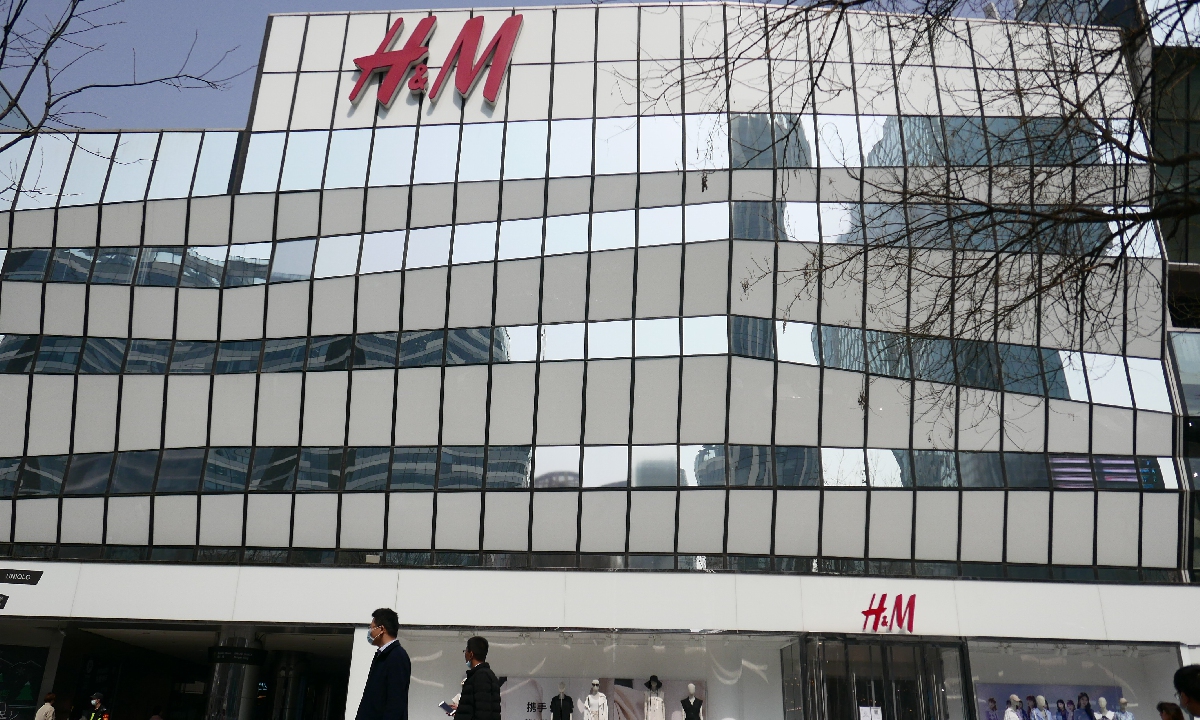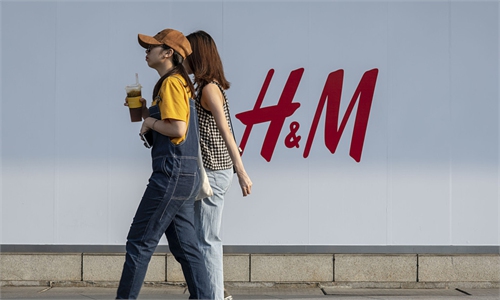
Global Times reporters visited one of Beijing's core commercial areas, Sanlitun, on Thursday around noon, where the biggest H&M store in the city is located, and found that only a few customers and passersby had gone inside, with even fewer buying products. Photo: Li Hao/GT
As online calls to boycott H&M grow over the brand's refusal to use Xinjiang cotton, shoppers reached by the Global Times reporters in Beijing and Shanghai on Thursday said they will not choose the brand unless it rectifies its stance.
Global Times reporters visited one of Beijing's core commercial areas, Sanlitun, on Thursday around noon, where the biggest H&M store in the city is located, and found that only a few customers and passersby had gone inside, with even fewer buying products.
"After seeing H&M's statement, I will not buy their products. They want to do business in China while insulting the Chinese at the same time. How can they expect us to buy their clothes or support them?" a passerby in Sanlitun told the Global Times on Thursday.
"Boycotting H&M will not have any impact on people like me, because there are many alternative choices. Many domestic brands have good designs, and I shop on Taobao to buy clothes most of the time, where the styles and quality are much better and prices are much lower than these brands," said a Beijing resident surnamed Zhao.
An online educator surnamed Zhang told the Global Times that he suspects there are Western forces behind H&M's statement. "They might have been manipulated by the West, but whatever the reasons are, I choose China's Lining."
Another Beijing resident who requested anonymity said that H&M is ignorant to believe the lies and rumors that the West created over Xinjiang-related issues.
An H&M store in a business district in Shanghai has upped its protection, posting security staff at the doors. The shopping assistants were also on the alert and stopped the GT reporter from taking photos.
Two shop attendants told the Global Times that they did not want this controversy but as employees there's little they could do about it.
A white collar worker surnamed Wang, whose workplace is close to the store, said, "As a big company, it should learn the lesson that it should respect Chinese people's feelings when it is doing business in China."
Wang hopes the boycott can convey the message that "Chinese people welcome foreign firms, but these companies need to respect Chinese people's feelings."
According to media reports, H&M stores in Harbin of Northeast China's Heilongjiang Province, Jinan of East China's Shandong Province and Urumqi of Xinjiang, have been closed amid fierce criticism from the public, who requested all H&M stores in China to be closed. A large H&M billboard in Chengdu, Southwest China's Sichuan Province, was also removed on Thursday, as shown on a video posted by local residents.
Chinese people can express their feelings. They do not accept foreign companies earning money from them on the one hand and smearing China on the other hand, the Chinese Foreign Ministry spokesperson said in response to the boycott of H&M and other foreign brands over their stances on Xinjiang cotton.
Refusing Xinjiang cotton, one of the best in the world, is a loss for those brands. The "forced labor" allegations were pure lies fabricated by some anti-China organizations, ministry spokesperson Hua Chunying said at Thursday's press conference.
The Chinese cotton industry provides jobs for people of all ethnic groups. Smearing such a good thing as forced labor only demonstrates that some countries had used slaves and cannot think in a different way, Hua said.


